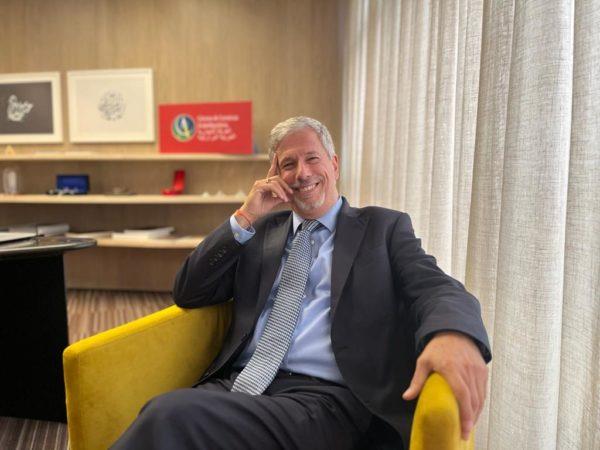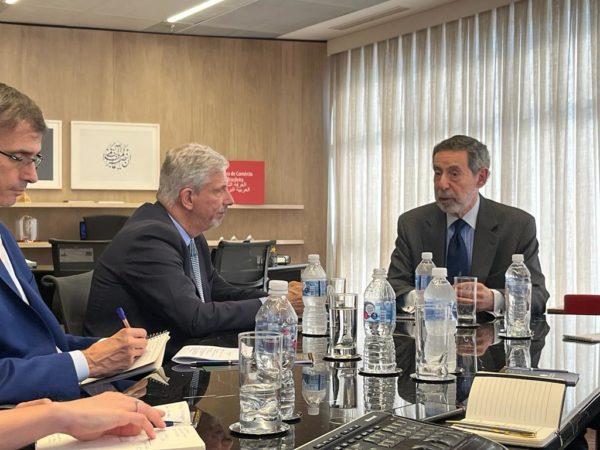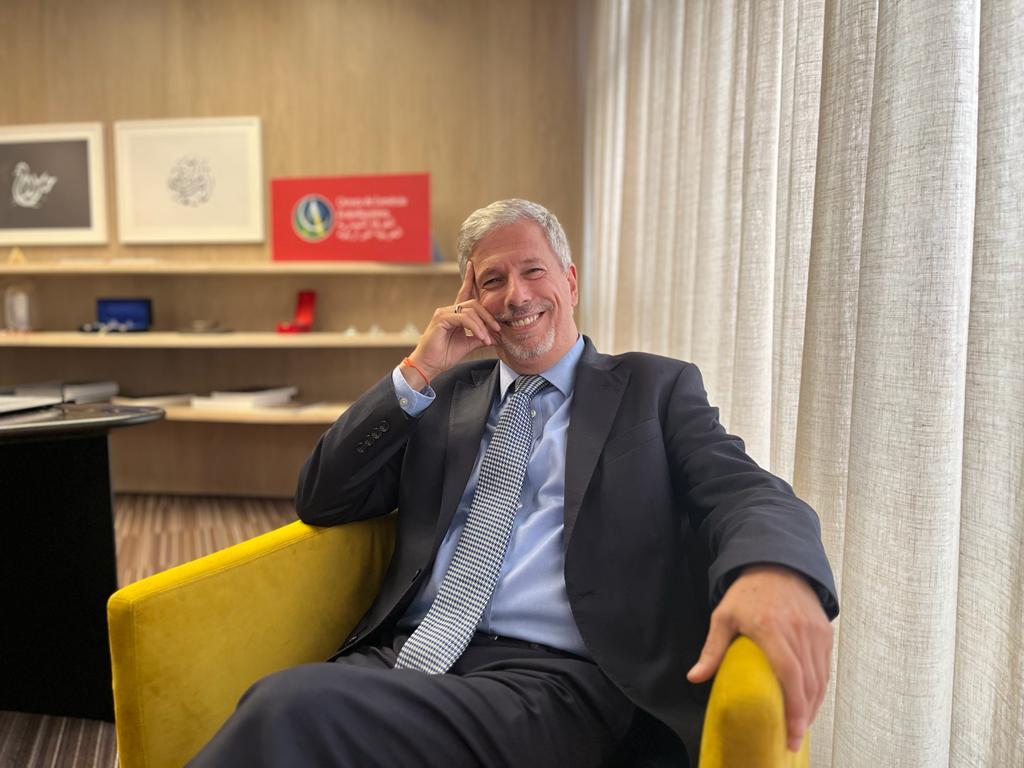(MENAFN- Brazil-Arab News Agency (ANBA))

São Paulo – The secretary for Trade Promotion, Science and Technology, Innovation and Culture of the Ministry of Foreign Affairs of Brazil, Laudemar Gonçalves de Aguiar Neto, took over his position four months ago following a two-year stint as Brazil's ambassador to Iran. He was welcomed in the headquarters of the Arab-Brazilian Chamber of Commerce (ABCC) on Tuesday (15) afternoon in São Paulo.
The secretariat that had been in place since the 1970s was recreated after four-year hiatus during the last administration and seek to always work in partnerships or networks with other stakeholders such as the Brazilian Trade and Investment Promotion Agency (ApexBrasil), embassies, the private sector, and the academy.
“It works in three spheres of action: trade and investment; science, technology and innovation; and culture and education, and sports, which I've been including. The idea is that all these spheres talk more and more, and I believe that innovation goes through it all, not only the secretariat, but across all spheres. Innovation in sports, the environment, trade... it all goes through innovation ,” Aguiar told ANBA.
The secretariat aims that the departments work in a more coordinated fashion, and that foreign embassies and some consulates that feature trade promotion departments also start addressing science, technology and innovation.“And where there's a science, technology and innovation department, we want it to have a link with all departments to include innovation in them, too. We're in this process,” he said.
Aguiar had been in Iran until early April. He took up the secretary role by the invitation of Foreign Affairs minister Mauro Vieira, who has been his personal friend for 30 years.“The idea is that the Secretariat has more coordination inside the Ministry. For example, if I have some initiative for an Arab country, I'd always coordinate it with the political secretariat in charge of the Middle East; if I have something related to the environment, I'd deal with Seclima, which is in charge of the environment, climate change, and energy [another secretariat that has been recreated in the current administration],” he said.
The secretary said it's very difficult to conduct trade promotion alone, and that coordination between the various stakeholders is crucial to obtaining better and more enduring results. State, and not administration, policies.
“When the embassies suggest some initiatives, we usually add other stakeholders. Our concern is to prevent that such initiatives are of the administration alone. We try to unite the Executive, the Legislative, the private initiative, the academy, because I believe as more groups of different interests come together, you can get more stable, more permanent, policies, that's what we call state policies ,” he said.

Secretary met ambassador Chohfi in the Arab Brazilian Chamber
According to him, this way it's harder to undo such work in a new administration, as the stakeholders will argue the initiative is important for them and that it should be kept.
“That's our goal, to make the Brazilian diplomatic work more and more like diplomatic work of state , not of an administration alone. Of course, priorities and adjustments will always differ, though,” he pondered.
Priorities
The priority for the secretariat, the diplomat says, is to resume relations with African and Latin American countries.“Particularly the African countries, where we have a larger presence, as we doubled the number of embassies in the African continent in the early 2000s. Some have been closed recently, but we'll resume it,” he said.
He added that the secretariat is making a joint effort with ApexBrasil, Brazil's Ministry of Agriculture and Livestock, and the private initiative to strengthen trade and innovation in some African countries.
“With all the difficulties in place, with all the challenges, come great opportunities, too. [It's important to be] in a continent that will grow more and more in the coming decades and create a whole lot of opportunities,” he said.
But it has to be resumed differently from how it was done twenty years ago, Aguiar said.“As many countries have taken up the space we one had – not only China, but India and Turkey, too,” he said.
As for the Arab countries , the Arab-Brazilian was the first the chamber of commerce that the secretary visited in his tenure. He said he plans to visit others and has appointments in the Brazil-Iran Chamber of Commerce and Industry.
“I've started with [the Arab-Brazilian] chamber not only because I know ambassador Osmar Chohfi but also due to importance we give to trade with the Arab countries and the potential we see in the increase and diversification of this trade and general cooperation, which is not only related to trade but also to investments , innovation , and cultural activities , too” he said.
He said there's little knowledge on which and how the Arab countries are, and what means to Muslim or halal .“[Halal] means much more than meat. There's a halal philosophy that is related to clothing, behaviors, tourism,” he said.
“There're cultural, historical-cultural and religious differences you have to learn to know how to deal with them and exchange information to better know them. I believe the more you know the other, more you can put yourself on their shoes and cooperate with them. If you already start from a biased perspective without even knowing the reason of the difference, it gets harder. That's the first step, accept the differences,” he said.
Another priority for the diplomat is to make Brazil a global trader again.“Now a great deal of our trade is concentrated in few countries – China, the United States, the European Union (states), and Argentina and other Mercosur countries. Saying like this makes it seems its well distributed, [but] it's distributed by continents, not countries, so we want to boost bilateral trade with countries in Latin American,” he said.
The secretary pointed out that countries in North America concentrate around half of their trade between them; in the European Union, an average of 60% of trade is between the countries in the block. ASEAN [Association of the Southeast Asian Nations] has 70% of its trade between its ten member states.
“And in Latin America, particularly South America, it's only 26%. So we have little trade and cooperation, and we could have much more cooperation with Latin America and the Caribbean . We have very little with Africa, we could have much more with the Arab countries, and with India, which is a really important country, our cooperation level is minimum,” he said.
The Ministry also plans on increasing what the secretary has called the neo-industrialization process.“We are conducting in this current administration the [growth acceleration plan , known as] PAC, to export more value-added goods,” he said.
The difference the newly created secretariat will make, Aguiar said, is being in harmony with all sectors.“There's a convergence we want to create. There's a convergence in the private sector, the government, and even in Congress, that we need to further develop our foreign relations and trade, which had been greatly development in the first decade and a half of the 2000s, and now we want to resume that,” he said.
This resumption also involves official missions that have included the business sector, the diplomat says.“As was the case with the visit of president Lula to China, Portugal, and now Angola [in late August]. We are more present and have worked always in coordination, always having in mind the priorities of the ABCC, [industry group] FIESP, and other players to work together.”
“The priorities of the government include finding converging points between the different players working in foreign trade,” he finished.
The meeting in the ABCC featured president Osmar Chohfi, secretary-general Tamer Mansour, International Relations vice president Mohamad Orra Mourad, and Institutional Relations analyst Elaine Prates.
Aguiar was accompanied by the advisor to the office of the Secretariat, Ricardo Fleury, and the head of Trade Promotion and Science and Technology of the Office of Representation in São Paulo of the Foreign Ministry, Mariana Thiele.
Translation by Guilherme Miranda
Bruna Garcia/ANBA
Bruna Garcia/ANBA
The post africa: a priority for brazilian foreign secretary appeared first on agência de notícias brasil-árabe .

.jpg)



















Comments
No comment